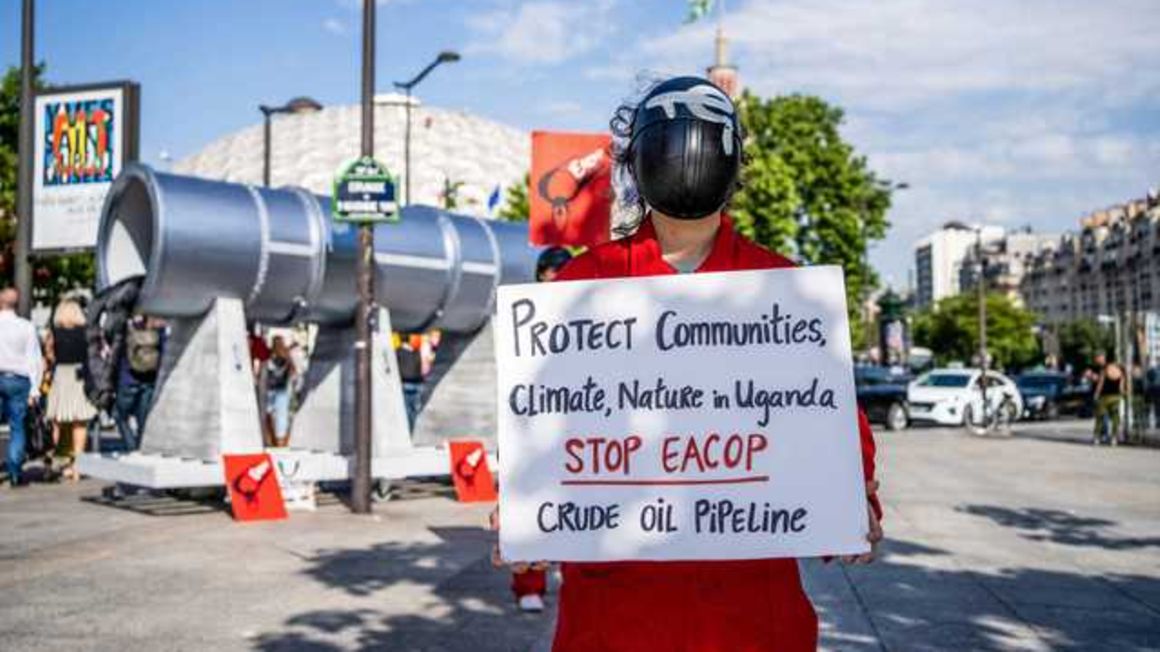Prime
Total boss slams Europe MPs on pipeline stance

Demonstrators protest the East Africa Crude Oil Pipeline (Eacop) in Paris, France, on September 23, calling for the protection of communities and nature in Uganda. PHOTO/FILE
What you need to know:
- The top official faulted the EU parliament for failing to respect the rule of law and making resolutions based on unfounded allegations.
The chief executive officer of the French oil giant, Total Energies SE, Mr Patrick Pouyanne, has slammed the “adversarial” conduct by a section of European Parliament (EU) MPs on September 15 during the passing of the resolution against the East African Crude Oil Pipeline (EACOP).
In a letter addressed to the president of the EU Parliament, Ms Roberta Metsola, a week later on September 22, Mr Pouyanne criticised the manner in which the resolution, denouncing alleged human rights abuses during pre-construction activities of the EACOP was passed in 48 hours, without hearing the Paris-based company’s side.
“I very much regret that the company and, by extension, its 105,000 employees should be publicly accused in this way by your institution, without being approached at any point for a prior adversarial discussion. I cannot help but feel that your Assembly should reach its opinions on subjects that it is free to select itself completely independently,” Mr Pouyanne wrote.
He added: “It seems to me that, in this case, the adversarial principle on which the rule of law is based has not been respected in any way whatsoever. And I consider that the Parliament’s adoption of resolutions containing factual inexactitudes, and statements based on unfounded allegations, some serious, to be most damaging.”
“The fact that the Subcommittee on Human Rights decided to extend an invitation to me after the fact, to express myself when the decision had already been taken, for aduration of “eight minutes” (according to the terms of the invitation), does not in any way correct the situation created by this deliberation, because the adversarial principle can scarcely apply retroactively. You will understand that I do not intend to accept the invitation under these circumstances.”
ALSO READ: Why EACOP project must go on
On September 15, EU MPs voted by a majority of 334 to pass the resolution that seeks to compel Uganda, Tanzania, and the Total Energies SE to elevate standards and adopt international best practices during the development of the EACOP.
One hundred and ninety-nine MPs voted against the resolution while 60 abstained. Prior to passing the resolution last month, a section of EU MPs were in Kampala for a fact-finding mission during which they met several stakeholders, including local NGOs and government agencies, and were apprised about pre-construction activities of the $3.8b (Shs14 trillion) project.
However, to the dismay of authorities in Kampala and Paris, some EU MPs stoked some claims.
One EU legislator, Germany’s Malte Gallee, shared on his Twitter account detailing possibly hundreds of rivers and streams through which the duct snakes from the central pumping terminal in Hoima in mid-western Uganda to Chongleani terminal at Tanga Port in Tanzania.
To the contrary, only 8km of the EACOP cuts through protected areas out of the total 1,443km pipeline route, while only 111km of the project right of way borders protected areas.
Regarding the resolution, whilst advisory, President Museveni blasted the EU MPs as “ego-centric-know it all” and warned that if TotalEnergies SE succumbed to pressure at home in Europe to walk away from the oil project, the government would shop around for other partners to work with.
EU resolution demands
The EU resolution demanded that Uganda, Tanzania and Total Energies SE—which backed the southern route through 10 districts in Uganda and 24 districts in eight regions in Tanzania—delay construction of the project by one year to consider another route with least environmental footprint.
ALSO READ: Address risks before construction of EACOP
The southern route to Tanzania was, however, considered as the “least cost option” for the EACOP. Other routes considered were, via north eastern Kenya to Lamu port which option is laden with mountainous terrain and insecurity at the border with Somalia, or to Momaba port which was found to be congested.
Tanzania’s Dar-es Salaam port was also considered but was found to be busy. The EACOP Company managing director, Mr Martin Tiffen, last week told a meeting of the Civil Society Coalition on Oil and Gas, an umbrella body, that they are open to engage with civil society actors based on facts.




